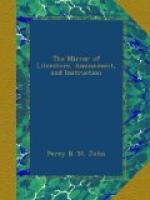“Edward, among whose weaknesses we cannot number cowardice, was reluctantly forced from the bloody field by the Earl of Pembroke. The noble Sir Giles de Argentine considered it as his duty to attend the King until he saw him in personal safety, then observing that “it was not his own wont to fly,” turned back, rushed again into the battle, cried his war-cry, galloped boldly against the victorious Scots, and was slain, according to his wish, with his face to the enemy. Edward must have been bewildered in the confusion of the field, for instead of directing his course southerly to Linlithgow, from which he came, he rode northward to Stirling, and demanded admittance. Philip de Mowbray, the governor, remonstrated against this rash step, reminding the unfortunate Prince that he was obliged by his treaty to surrender the castle next day, as not having been relieved according to the conditions.
“Edward was therefore obliged to take the southern road; and he must have made a considerable circuit to avoid the Scottish army. He was, however, discovered on his retreat, and pursued by Douglas with sixty horse, who were all that could be mustered for the service. The King, by a rapid and continued flight through a country in which his misfortunes must have changed many friends into enemies, at length gained the castle of Dunbar, where he was hospitably received by the Earl of March. From Dunbar Edward escaped almost alone to Berwick in a fishing skiff, having left behind him the finest army a King of England ever commanded.
“The quantity of spoil gained by the victors at the battle of Bannockburn was inestimable, and the ransoms paid by the prisoners largely added to the mass of treasure. Five near relations to the Bruce—namely, his wife, her sister Christian, his daughter Marjory, the Bishop of Glasgow (Wishart), and the young Earl of Mar, the King’s nephew, were exchanged against the Earl of Hereford, High Constable of England.
“The Scottish loss was very small: Sir William Vipont and Sir Walter Ross were the only persons of consideration slain. Sir Edward Bruce is said to have been so much attached to the last of these knights as to have expressed his wish that the battle had remained unfought, so Ross had not died.”
The present volume contains 350 pages, in a very pleasing type, and a vignette title; and the style in which it is produced is uniformly worthy of the very responsible quarter whence it emanates.
* * * * *
THE YOUNG LADY’S BOOK.
This is indeed a golden gift for any demoiselle of our readers’ acquaintance, for it blends the unusual qualities of elegance and usefulness of the highest order. It is described in the title as “A Manual of Elegant Recreations, Exercises and Pursuits,” and numbers in its contents, Moral deportment—the Florist—Mineralogy, Conchology, Entomology, the Aviary, the Toilet, Embroidery,




